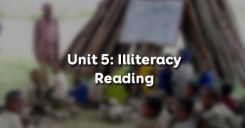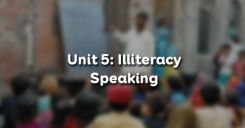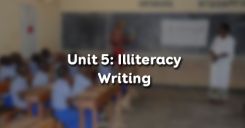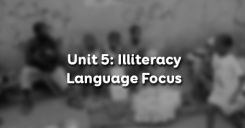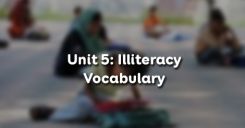Bài học Listening Unit 5 Lớp 11 - Illiteracy giúp các em rèn luyện kỹ năng nghe hiểu mở rộng để chọn đáp án đúng trong nội dung bài xoay quanh chủ điểm về vấn đề học và phổ cập giáo dục.
Tóm tắt bài
1. Before You Listen Unit 5 Lớp 11
Work in pairs. Ask and answer the questions. (Làm việc theo cặp. Hỏi và trả lời các câu hỏi.)
1. Have you ever done a survey? (Bạn đã từng thực hiện một cuộc khảo sát nào chưa?)
2. Do you know where Perth is? (Bạn có biết thành phố Perth ở đâu không?)
Guide to answer
1. No, I haven't.
2. Yes. Perth is the capital and largest city of the Australian state of Western Australia.
No. I don't know.
Listen and repeat.
effective: có hiệu quả
maturity: sự trưởng thành
weaknesses: tình trạng yếu đuối
performance: cuộc biểu diễn
self-respect: sự tự trọng
academic: (thuộc) học viện, đại học
2. While You Listen Unit 5 Lớp 11
2.1. Unit 5 Lớp 11 Listening Task 1
Listen and choose the best option to complete the following sentences. (Nghe và chọn đáp án tốt nhất để hoàn thành câu sau.)
1. The students were asked to _________ what makes an effective school.
A. express their attitudes towards
B. deliver speeches on
C. exchange their ideas about
D. give their opinions on
2. Most of the students thought they should be encouraged to ______ for their own learning.
A. develop new styles
B. set realistic goals
C. develop their strategies
D. consult their teachers
3. About ______ of the students expected their teachers to be motivated and interested in what they were doing.
A. 80 per cent
B. 55 per cent
C. 60 per cent
D. 100 per cent
4. Nearly all the students believed that learning should focus on _______.
A. the importance of life
B. the importance of skills
C. important life skills
D. important communication skills
Guide to answer
1. D
2. B
3. B
4. B
2.2. Unit 5 Lớp 11 Listening Task 2
Listen again and answer the questions. (Nghe lại và trả lời các câu hỏi.)
1. Where did the survey take place? (Cuộc khảo sát đã được thực hiện ở đâu?)
2. What percentage of the students felt mutual respect was essential for effective learning to take place? (Có bao nhiêu phần trăm học sinh nghĩ rằng sự tôn trọng lẫn nhau là cần thiết cho việc học tập có hiệu quả?)
3. What did the older students feel? (Các sinh viên khác nghĩ gì?)
Guide to answer
1. It took place in Perth.
2. 80 percent of the students.
3. They felt that they should be allowed to give some input into school decision making.
3. After You Listen Unit 5 Lớp 11
Work in groups. Discuss the question: Which do you think is more essential for better learning - good teachers or good textbooks? (Làm việc nhóm. Thảo luận câu hỏi: Theo bạn thì đâu là điều kiện cho việc học tốt hơn: giáo viên giỏi hay sách giáo khoa tốt?)
Guide to answer
A: Which do you think is more essential for better learning - good teachers or good textbooks?
B: Textbooks are essential teaching and learning materials in any programme and syllabus. Having good textbooks is very important. Good textbooks provide students with adequate knowledge, skills and practice. Good textbooks also guide students how to learn and help them study effectively on their own.
C: However, having good teachers may be more important than having good textbooks because a good teacher can turn a poor quality textbook into an interesting one. In fact, a good teacher can even replace the textbook, motivate students to learn, and train them to use self-studying skills. Besides that, the teachers must take responsibilities for the students' learning.
4. Tapescript Listening Unit 5 Lớp 11
In an informal survey carried out in Perth, western of Australia, students were asked to give their views on what makes an effective school. 80 per cent of the students felt that mutual respect in the classroom was essential learning to take place. This implied that students should be treated as individuals with both their strengths and their weaknesses. 60 per cent of the students felt they should be encouraged to set realistic goals for their learning, and to have positive attitudes towards themselves and others.
About 55 per cent of the students expected their teachers to be motivated and interested in what they were doing: this would then reflect in their performance of the students. Nearly all the students believed that learning should be centered on important life skills such as communication, building self-respect and self- confidence, the ability to learn from failure, and time management, suited to the maturity of the students concerned.
One hundred per cent of the students felt that the social side of school was as important as academic activities. The older students felt that they should be allowed to give some input school decision making a direct effect on students.
5. Bài tập trắc nghiệm
Như vậy là các em đã xem qua bài giảng phần Listening Unit 5 Lớp 11. Để củng cố kiến thức bài học mời các em tham gia bài tập trắc nghiệm Trắc nghiệm Unit 5 lớp 11 Listening.
-
Câu 1: Read the passage carefully and choose the correct answer
Direct attacks on illiteracy take two main forms, adult education and the establishment of public schools with compulsory attendance for children. In many countries, there are certain programs which have been instituted to fight adult illiteracy; and universal public education has almost eliminated illiteracy among the young. Soldiers have been appointed effectively as instructors for the public.
Throughout most of history most people have been illiterate. In former society, the ability to read and write was of value only to the clergy and aristocracy. The first known reference to “literate laymen” did not appear until the end of the 14th century. Illiteracy was not seen as a problem until after the invention of printing in the 15th century. The first significant decline in illiteracy came with the Reformation, when translation of the Bible into the vernacular became widespread and Protestant converts were taught to read it. Revolutionary political movements from the 18th to the 20th century generally included an attack on illiteracy as one of their goals, with the former Soviet Union, China, and Cuba being among the most successful in the 20th century.
According to the passage, the anti-illiteracy programs are for ____.
- A. adults
- B. children
- C. those who are literate
- D. both adults and children
-
Câu 2:
In former society, _____.
- A. everybody was illiterate
- B. everybody was literate
- C. the clergy and aristocracy was not illiterate
- D. everybody had the ability to read and write
-
Câu 3:
In the 14th century, _____.
- A. only clergy could read and write
- B. laymen began to learn how to read and write
- C. only royal members could read and write
- D. everybody began to go to school
Câu 4-10: Mời các em đăng nhập xem tiếp nội dung và thi thử Online để củng cố kiến thức về bài học này nhé!
6. Hỏi đáp Listening Unit 5 Lớp 11
Trong quá trình học tập nếu có thắc mắc hay cần trợ giúp gì thì các em hãy comment ở mục Hỏi đáp, Cộng đồng Tiếng Anh HOC247 sẽ hỗ trợ cho các em một cách nhanh chóng!
Chúc các em học tập tốt và luôn đạt thành tích cao trong học tập!
-- Mod Tiếng Anh 11 HỌC247






